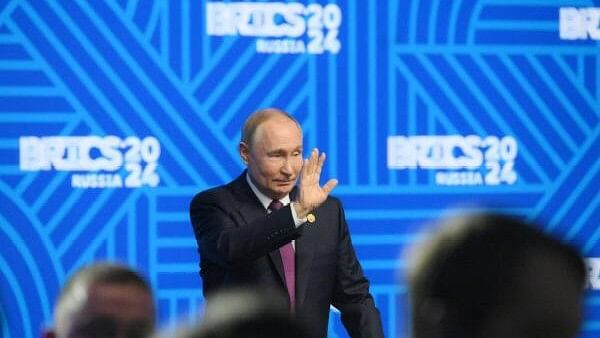
Russian President Putin attends a press conference at the end of BRICS summit in Kazan.
Credit: Reuters Photo
At the recently concluded BRICS summit in Kazan, Russia, Russian President Vladimir Putin pushed for an ‘alternative payments system’ that would prevent the weaponisation of the US dollar (USD). Sanctions by Western nations ever since Russia invaded Ukraine in February 2022 has meant that Moscow is pushing its allies and other countries to circumvent these restrictions.
The Central Bank of Russia, headquartered in Moscow, is overseeing the integration of cryptocurrencies into the National Payment Card System (NPCS), which acts as a clearing house for international payments within Russia.
Russia currently faces sanctions from the United States, the United Kingdom, and the European Union. Reports indicate that over 16,500 sanctions have been imposed, targeting sectors from diamonds to metals and energy exports. Consequently, around half of Russia’s foreign currency reserves of over $300 billion have been frozen.
US sanctions on foreign banks operating in Russia have significantly complicated cross-border payments for Russian businesses. Russia is turning to cryptocurrency exchanges to mitigate these challenges to facilitate smoother international transactions.
In July, Russia’s parliament approved new legislation to legalise cryptocurrency mining and create a regulatory framework for digital tokens, with oversight by the central bank. President Vladimir Putin signed this legislation into law on August 8, signalling a major shift in Russia’s approach to cryptocurrencies. These new laws aim to provide Russian businesses with a viable alternative for international transactions amid increasingly restrictive financial sanctions.
While Western sanctions have hurt the Kremlin, Russia has managed to sustain its economy by continuing to export to countries like China, Turkey, Indonesia, and India.
For example, while India continues to buy Russian oil, it does not pay in US dollars but in Indian rupees. Given Russia’s limited use of the INR, approximately $45 billion of Russian payments are currently held in Rupee Vostro accounts in Indian banks, with the surplus continuing to grow as India continues to purchase cheaper oil. Recently, Russian companies used nearly $4 billion from these Vostro accounts to buy Indian arms.
A Vostro account is essentially a bank account held by a domestic bank on behalf of a foreign bank, enabling trade in local currencies. India maintains such accounts with 22 countries, including Russia.
The success of Russia’s decision to use cryptocurrencies for international trade will depend on whether this strategy finds acceptance among its allies, such as China, Iran, and India. For sovereign nations the volatility and complex nature of the asset, not to mention the international ramifications, are immense.
Under Putin, Russia has slowly but steadily begun recognising crypto assets. In late July, the State Duma, Russia’s lower house of parliament, legalised cryptocurrency mining starting November 1. This newfound enthusiasm for cryptocurrencies comes after Binance, the world’s largest cryptocurrency exchange, had to leave Russia last year following accusations of helping clients move funds out of sanctioned Russian banks.
China, which is a major trading partner of Russia, has completely banned cryptocurrencies, while India imposes high taxes on cryptocurrency transactions compared to other assets like equity and gold. In India, crypto exchanges are regulated by the Financial Intelligence Unit (FIU), under the Prevention of Money Laundering Act (PMLA) of 2002.
In a 2022 X post, Ripple CEO Brad Garlinghouse outlined reasons why cryptocurrency cannot be easily used by Russia to evade sanctions. He emphasised that stringent Know-Your-Customer (KYC) and Anti-Money Laundering (AML) regulations are in place to prevent sanctioned entities, as listed by the US Office of Foreign Assets Control (OFAC), from bypassing these measures. The OFAC, a division of the US treasury department, administers and enforces US economic and trade sanctions. Garlinghouse noted that converting cryptocurrency to fiat currency requires banking partners, who risk losing their licenses if they inadvertently facilitate transactions for OFAC-listed individuals.
So, what has changed now? According to the Russian news agency RIA Novosti, the Bank of Russia will be allowed to use cryptocurrencies for foreign trade settlements. Within the framework of the Experimental Legal Regimes (EPR), the central bank may also create an electronic platform for digital currency operations based on the National Payment System (NPS), determine its rules, and set requirements for its operator.
Russia is not the first country attempting to bypass sanctions by quickly adopting cryptocurrencies. Venezuela, facing hyperinflation, adopted cryptocurrency as legal tender after its economy collapsed due to US sanctions over alleged human rights violations and political oppression by President Nicolas Maduro. It discontinued it in January. El Salvador became the first Central American nation to adopt Bitcoin as legal tender.
However, not all cryptocurrencies are suitable as a medium of exchange. Highly volatile assets like Bitcoin and Ethereum pose challenges for countries looking to use them for balance of payments. At present, countries like Russia may rely more on stablecoins, such as Tether (USDT) and USD Coin (USDC), which derive their value by being pegged to stable assets like the USD. Other stablecoins, like PAX Gold (PAXG) and Tether Gold (xAUT), are pegged to gold prices.
While Russia’s steps toward using cryptocurrencies for international trade may be tentative, it represents a bold move by a large sovereign nation to adopt a relatively new and untested financial instrument. Unlike gold, which has millennia of history, cryptocurrencies have been around for just over a decade or two.
Bitcoin, invented after the 2008 global recession, remains largely unregulated worldwide, but many countries and corporations are approaching the crypto world with caution and curiosity.
(Abhishek Patni is a New Delhi-based senior journalist. X: @Abhishek_Patni)
Disclaimer: The views expressed above are the author's own. They do not necessarily reflect the views of DH.